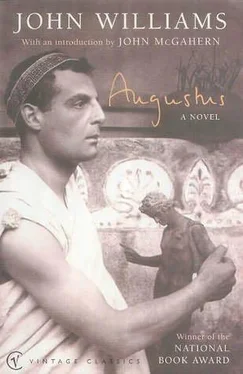John Williams - Augustus
Здесь есть возможность читать онлайн «John Williams - Augustus» весь текст электронной книги совершенно бесплатно (целиком полную версию без сокращений). В некоторых случаях можно слушать аудио, скачать через торрент в формате fb2 и присутствует краткое содержание. Жанр: Историческая проза, на английском языке. Описание произведения, (предисловие) а так же отзывы посетителей доступны на портале библиотеки ЛибКат.
- Название:Augustus
- Автор:
- Жанр:
- Год:неизвестен
- ISBN:нет данных
- Рейтинг книги:3 / 5. Голосов: 1
-
Избранное:Добавить в избранное
- Отзывы:
-
Ваша оценка:
- 60
- 1
- 2
- 3
- 4
- 5
Augustus: краткое содержание, описание и аннотация
Предлагаем к чтению аннотацию, описание, краткое содержание или предисловие (зависит от того, что написал сам автор книги «Augustus»). Если вы не нашли необходимую информацию о книге — напишите в комментариях, мы постараемся отыскать её.
Augustus — читать онлайн бесплатно полную книгу (весь текст) целиком
Ниже представлен текст книги, разбитый по страницам. Система сохранения места последней прочитанной страницы, позволяет с удобством читать онлайн бесплатно книгу «Augustus», без необходимости каждый раз заново искать на чём Вы остановились. Поставьте закладку, и сможете в любой момент перейти на страницу, на которой закончили чтение.
Интервал:
Закладка:
And yet in some ways it may be the basest form of love. For if we strip away the high rhetoric that so often surrounds this notion, it is revealed simply as a love of power. (Forgive me, my dear Nicolaus; let us pretend that once again we are engaging in one of those quibbles with which we used to amuse ourselves.) It is the power that the philosopher has over the disembodied mind of his reader, the power that the poet has over the living mind and heart of his listener. And if the minds and hearts and spirits of those who come under the spell of that appointed power are lifted, that is an accident which is not essential to the love, or even its purpose.
I have begun to see that it is this kind of love that has impelled me through the years, though it has been necessary for me to conceal the fact from myself as well as from others. Forty years ago, when I was in my thirty-sixth year, the Senate and people of Rome accorded me the title of Augustus; twenty-five years later, when I was in my sixty-first year, and in the same year that I exiled my daughter from Rome, the Senate and people gave me the title of Father of my Country. It was quite simple and appropriate; I exchanged one daughter for another, and the adoptive daughter acknowledged that exchange.
To the west, in the darkness, lies the Island of Pandateria. The little villa where Julia lived for five years is uninhabited now and by my orders uncared for. It is open to the weather and the slow erosion of time; in a few years it will begin to crumble, and time will take it, as it takes all things. I hope that Julia has forgiven me my sparing her life, as I have forgiven her for having thought to take mine.
For the rumors that you must have heard are true. My daughter was a member of the conspiracy that had as its end the assassination of her husband, and the murder of myself. And I invoked those marriage laws that had so long lain unused and condemned her to a life of exile, so that she might not be condemned to death by the secret effort of her husband, Tiberius, who would have made her endure a trial for treason.
I have often wondered whether my daughter has ever admitted to herself the extent of her own guilt. I know that the last time I saw her, in her confusion and grief at the death of Julius Antonius, she was not able to do so. I hope that she will never be able to do so, but will live out her life in the belief that she was the victim of a passion which led to her disgrace, rather than a participant in a conspiracy that would certainly have led to her father's death, and almost certainly would have destroyed Rome. The first I might have allowed; the second I could not.
I have relinquished whatever rancor I might have had against my daughter, for I have come to understand that despite her part in the conspiracy there was always a part of Julia that remained the child who loved the father who was perhaps too doting; a part of her that must have recoiled in horror from what she felt she was at last driven to do; a part of her that still, in the loneliness of Reggio, remembers the daughter that once she was. I have come to understand that one can wish for the death of another and yet love that victim without appreciable diminution. At one time I was in the habit of calling her my Little Rome, an appellation that has been widely misunderstood; it was that I wished my Rome to become the potentiality that I saw in her. In the end, they both betrayed me; but I cannot love them the less for that.
To the south of our anchorage, the Lucrine Lake, dredged once by honest Italian hands so that the Roman fleet might protect the people, furnishes oysters for the tables of the Roman rich; Julia languishes on the barren Calabrian coast at Reggio; and Tiberius will rule the world.
I have lived too long. All those who might have succeeded me and striven for the survival of Rome are dead. Marcellus, to whom I first betrothed my daughter, died at the age of nineteen; Marcus Agrippa died; and my grandsons, the sons of Agrippa and Julia, Gaius and Lucius, died in the service of Rome; and Tiberius's brother, Drusus, who was both more able and equable than his brother, and whom I raised as my own son, died in Germany. Now only Tiberius remains.
I have no doubt that more than any other Tiberius was responsible for the fate of my daughter. He would not have hesitated to implicate her in the conspiracy against his life and my own, and he would have been pleased to see the Senate pass the sentence of death upon her, while he assumed the demeanor of sorrow and regret. I cannot bring myself to do other than despise Tiberius. At the center of his soul there is a bitterness that no one has fathomed, and in his person there is an essential cruelty that has no particular object. Nevertheless he is not a weak man, and he is not a fool; and cruelty in an Emperor is a lesser fault than weakness or foolishness. Therefore I have relinquished Rome to the mercies of Tiberius and to the accidents of time. I could do no other.
August 11
During the night, I did not move from my couch but kept a vigil on the stars that move slowly in their eternal voyage across the great dome of the sky. Toward dawn, for the first time in days, I dozed a little; and I had a dream. I was in that curious state where one dreams and knows that one dreams, yet finds there a reality which mocks that of one's waking life; I wished to remember the contours ofthat other world; but when I was awakened, the memory of the dream fled into the brightness of the morning.
I was awakened by the stirring of the crew, and by the sound of a distant singing; for a moment, in my confusion, I thought of those Sirens of whom Homer wrote so beautifully, and imagined myself to be bound to the mast of my ship, helpless against the call of an unimaginable beauty. But it was not the Sirens; it was a grain-ship from Alexandria that sailed slowly toward us from the south, and the Egyptian crew, dressed in white robes with garlands on their heads, stood on deck singing in their native tongue as they approached us; and the musky odor of burning incense was borne to us on the morning breeze.
We watched their approach with some puzzlement, until at last the huge ship which dwarfed our own came so close that we could make out the smiling swarthy faces of the men; and then the captain stepped forward and hailed me by name.
With some difficulty, which I trust I concealed even from Philippus, I rose from my couch and went to the deck rail, upon which I leaned while I returned the greeting of this captain. It appeared that the ship had unloaded a cargo of goods at the harbor between Puteoli and Naples, and had been informed of my presence nearby; and the crew had wished, before they made their way back to their far Egyptian homeland, to greet me and to give me thanks. The ship was so close that I did not have to shout, and I could see clearly the dark face of the captain. I inquired his name; it was Pothelios. And as the crew continued its low singing, Pothelios said to me:
"You have given us the liberty to sail the seas and thus furnish Rome with the bountiful goods of Egypt; you have rid the seas of those pirates and brigands that in the past would have made that liberty empty. Thus the Egyptian Roman may prosper, and may return to his homeland secure in the knowledge that only the accidents of wind and wave threaten his safety. For all this we give thanks to you, and pray that the gods will allow you good fortune for the rest of your days."
For a moment I could not speak. Pothelios had addressed me in a stiff but passable Latin; and it occurred to me that thirty years ago he would have spoken in that demotic Egyptian Greek and that I would have been hard put to understand him. I returned the captain's thanks and said a few words to the crew, and directed Philippus to see that each member ofthat crew be given some coins of gold. Then I returned to my couch, from where I watched the huge freighter turn slowly away from us and move southward, its sails bulging in the wind, its crew waving and laughing, happy in their safety and homeward voyage.
Читать дальшеИнтервал:
Закладка:
Похожие книги на «Augustus»
Представляем Вашему вниманию похожие книги на «Augustus» списком для выбора. Мы отобрали схожую по названию и смыслу литературу в надежде предоставить читателям больше вариантов отыскать новые, интересные, ещё непрочитанные произведения.
Обсуждение, отзывы о книге «Augustus» и просто собственные мнения читателей. Оставьте ваши комментарии, напишите, что Вы думаете о произведении, его смысле или главных героях. Укажите что конкретно понравилось, а что нет, и почему Вы так считаете.











